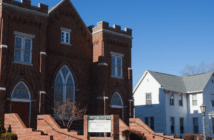Mike Schreiner and Ken Willard say too many churches are driven by structure and programs, not the imperative of making disciples. They outline 16 symptoms related to membership, service, finances, and fruitfulness that may indicate that your church needs to renew its focus on disciple making.
A discipleship process is an intentional method created to help individuals continually grow closer to the full likeness of Christ in all areas of their lives. We cannot do it for someone else. However, we can partner with them on the journey and provide teaching opportunities as well as opportunities to apply what they learn through doing. We can give encouragement and offer real-life examples to keep them moving and growing as disciples. Everyone is at a different place on their spiritual growth path, and our role is to help them take one more step toward Jesus.
Today churches of all sizes are mainly driven by structure and programs, not by making disciples. We believe this has moved us away from our true mission and created our current culture of declining attendance and disconnection from the local mission field.
In Matthew 16:2-3, Jesus admonished the Pharisees and Sadducees for not being able to “recognize the signs” all around them. Today churches of all sizes are mainly driven by structure and programs, not by making disciples. We believe this has moved us away from our true mission and created our current culture of declining attendance and disconnection from the local mission field.
Here are some of the signs we have found in churches needing a renewed focus on making disciples:
Turnover
- Does your church receive a lot of first and second time guests, but then never see them again? Is the back door of the church as large as the front door?
- Losing people after a major event. Sometimes people come to a baptism, wedding, confirmation, VBS, mission trip, new facility opening never to return once that event is over.
- New members who are excited to join. They initially get involved in various ministries, and then suddenly stop coming.
- Long-term members who leave over some minor issue. “How dare they change the color of the carpet without consulting me!”
Service
- Inability to fill volunteer positions. The church finds itself resorting to begging people to serve and, in some cases, even threatening, “If no one steps up to serve, then we will have to stop this ministry.”
- New members and attendees coming to worship, but not serving anywhere.
- Established members reporting ministry “burn-out.”
Missed Connections
- Members and attendees not inviting family or friends to worship or other church events.
- Church events that are only fellowship gatherings instead of “bridge events.” Bridge events allow new people to experience the church in a safe, nonthreatening way and receive an invitation to attend a worship service.
- Ministries not producing new fruit. Instead, these just move people from group to group or study to study.
Church Finances
- The church lives from offering to offering and always talks about how to raise money and cut expenses.
- Members and attendees do not grow in their financial giving from year to year.
- Too much dedicated giving. The church finds itself emphasizing funding specific ministries instead of focusing on the general ministry fund.
- Church ministries being funded by selling items or holding special fundraising events. For example, the youth ministry is totally dependent on selling cookies. The annual white elephant sale is the only funding for the women’s ministry.
- Leaders not setting the example of tithing.
- The congregation’s discomfort with money. Members do not want the pastor to talk about money or know how much each person or family gives.
This article is adapted from Stride: Creating a Discipleship Pathway for Your Church (Abingdon Press, 2017) by Mike Schreiner and Ken Willard. Used by permission. The book is available at Cokesbury and Amazon.
Related Resources
- Developing an Intentional Discipleship System by Junius Dotson
- 7 Steps for Making Disciples Through Relational Mentoring by Ken Carter and Audrey Warren
- What is Your Faith Development Process? by Bob Farr and Kay Kotan






